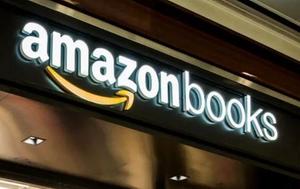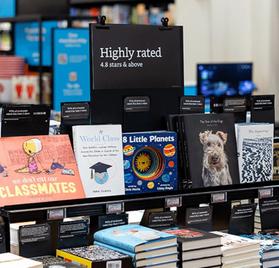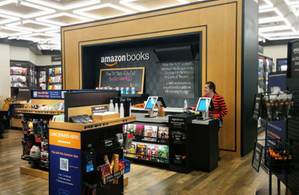
Bradley Graham, co-owner of Politics and Prose, Washington, D.C., and a former reporter and editor at the Washington Post, wrote an opinion piece in the Post, owned by Amazon founder Jeff Bezos, called "I'm a Bookseller. Here's the Difference Between Jeff Bezos and Me."
He said, in part, "In style and concept, Amazon's stores differed markedly from the independent bookstores that dot the D.C. landscape. They conveyed the parent company's homogenized corporate identity rather than the distinctive character of their communities. They lacked the quirky personality and warmth of indies. And their book offerings were based not on the choices of individual buyers familiar with the interests of local customers but on data generated from Amazon's online shoppers. Walk into an Amazon bookstore and you'd see what everyone else was reading, not a thoughtfully curated selection of books worth discovering....
"Amazon's retreat from the physical bookstore business underscores what those of us in it know all too well: It isn't easy. It requires superb customer service, dedicated staff who provide knowledgeable advice about what to read, an inviting environment in which to browse and shop, and literary activities that connect patrons directly to authors through book talks and other programming. Most of all, it demands a deep commitment to the local communities that sustain us."

"Their model never looked sustainable. Customers love their online customer service, but that didn't translate into a physical space."
Andy Hunter, founder and CEO of Bookshop.org, said, "When Amazon started opening their version of a bookstore, often within blocks of beloved local bookstores, everyone was concerned. But visitors found nothing to fall in love with. The stores, as reported in the New Republic, seemed both 'bizarre' and 'wildly banal,' betraying 'inexperience with retail.' They were built to attempt to mirror an online shopping experience, neglecting the very things that make independent bookstores so valuable--personality, an honest love for books, and heart. It's gratifying to see Amazon give up on their algorithm-curated bookstores. We'll never give up on the human-curated ones."
 And in the New Republic (quoted by Hunter), Alex Shepard wrote in part:
And in the New Republic (quoted by Hunter), Alex Shepard wrote in part:
"America's worst bookstore chain is no more....
"Amazon Books was always awkwardly situated between the company's pitiless approach to commerce--its all-consuming need to be a 'disruptor' in everything that it does--and the necessities of old-fashioned retailing, particularly bookstores. It was also simultaneously a P.R. stunt--an attempt to put a human face on the grim smiley face that adorns the company's boxes--and a weird experiment, an attempt to use physical retail stores to mine data about how customers shop in person...
"Amazon Books was run by a company that had striven literally to transform the publishing industry to its will. Its ruthlessness was legendary. It squeezed publishers for vast discounts, sold books at a loss to drive out competitors, and treated the publishing industry writ large as a relic worth devouring. Bezos himself once instructed his staff to pursue publishers the way a hungry cheetah pursues a gazelle: 'The cheetah looks for the weak, looks for the sick, looks for the small.' Yes, Jeff loves books, for what sounds suspiciously like dinner....
"If you were interested in anything less than mega-bestselling titles, you were given precious few options. This was a bizarre turn for a company that prided itself on being the 'Everything Store,' and it never quite worked. For all its commercial innovations, Amazon has never quite figured out how to simply recommend books to customers, something that normal bookstores do quite well. Instead, it has achieved its remarkable growth via old-fashioned methods, mainly selling things at much lower prices than its competitors...
"Amazon has never had any particular affection or interest in books or bookselling. Books have only ever been Amazon's foothold for a larger ambition: dominating every face of American retail. In the case of Amazon Books, this led to a failure on many fronts. It was a store that didn't succeed in large part because of how closely it was tied to the company's imperial ambitions. Its failure won't matter much in the long run, but it is certainly briefly satisfying--particularly for independent bookstores within driving distance of these failed experiments."

